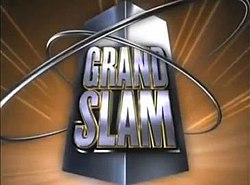Grand Slam (US game show)
| Grand Slam | |
|---|---|
 |
|
| Starring |
Dennis Miller Amanda Byram Pat Kiernan (off-camera) |
| Country of origin | United States |
| No. of seasons | 1 |
| No. of episodes | 8 |
| Production | |
| Running time | 60 minutes |
| Production company(s) |
Embassy Row Productions Sony Pictures Television |
| Release | |
| Original network | GSN |
| Original release | August 4 – September 8, 2007 |
Grand Slam is an American game show based on the British series of the same name. Unlike the British series, which was played as a regular quiz show, the American version was conducted as a super-tournament featuring contestants who had appeared on other game shows.
Grand Slam aired on GSN for eight episodes from August 4 to September 8, 2007. Dennis Miller and Amanda Byram hosted the program and provided commentary between rounds. The questions were asked by Pat Kiernan, who was never seen on camera. The series was produced by Embassy Row Productions in association with Sony Pictures Television and GSN. The 74-game Jeopardy! champion Ken Jennings won the Grand Slam tournament, defeating Ogi Ogas in the final round.
The program featured 16 of the biggest winners in United States game show history in a single-elimination tournament. The contestants were seeded by the amount of money they won on their original show(s). The winner took home the $100,000 Grand Prize and a crystal trophy.
The contestants faced off against each other in a rapid-fire style series of questions. There were four rounds of questioning: General Knowledge, Numbers and Logic, Words and Letters, and "Mixed" (questions from all of the previous categories). Exclusively for the final match, a fifth "Contemporary Knowledge" round was added as round #3, between "Numbers and Logic" and "Words and Letters". In each round, the players were given one minute on their clocks, and the first contestant (determined by coin toss for the first round where the loser goes first; alternates for each subsequent round) was asked a question by the off-camera "Questioner", and his clock started counting down. The timing mechanics were similar to those of a chess clock; if a contestant answered correctly, his clock stopped, and his opponent's clock started running. If the active contestant answered incorrectly or passed, their clock continued to run and another question was asked.
...
Wikipedia
